What is the best dog food for Labradoodle puppies? What about adults? Here are the best Labradoodle dog food brands and products that pup parents swear by. We’ll discuss everything you need to know about Labradoodle dog food, so let’s get started!
Table of Contents
- Best Dog Food For Labradoodles: Brand Reviews
- Common Health Issues of Labradoodles & How Specific Foods Help Them
- What to Look For While Choosing The Best Food For Labradoodle Puppies & Adults
- Ingredients To Avoid In Labradoodle Dog Food
- How To Switch Your Labradoodle’s Dog Food
- Labradoodle Feeding Chart (Puppy to Adult)
- Frequently Asked Questions On The Best Food For Labradoodles
Best Dog Food For Labradoodle – Quick Overview Of Our Top Picks For Labradoodles
If you’re in a rush, here’s a quick overview of the best dog foods for Labradoodles. We do, however, recommend you stick around for the rest of this guide, as we have some excellent tips for you to keep in mind when choosing a dog food formula for your four-legged best pal!
-
Pick #1:
Purina Pro Plan. Probably the most well-known dog food brands amongst Labradoodle owners. And for a good reason, too! Purina Pro Plan has lots and lots of different dry kibble and wet food formulas for Doods of all ages. Whether your Labradoodle has a more sensitive tummy or some kind of a health consideration, they’ve surely got a good formula for your Dood.
-
Pick #2:
Fromm. For five generations, the family behind Fromm has crafted tasty, high-quality formulas for dogs of all walks of life. Our top pick for Labradoodles is their Fromm Adult Gold dry dog food that’s packed with premium quality protein, healthy fats, and tummy soothing fiber.
-
Pick #3:
pawTree. Formulated in close collaboration with veterinarians and phD’s in Animal Science and Pet Nutrition, pawTree focuses on prevention of health issues by only using the highest quality ingredients as well as a wide variety of vitamins, minerals, probiotics, and other healthful supplements.
-
Pick #4:
Victor. A brand that’s loved by professional dog breeders, kennels, and parents to active sporting dogs, Victor provides nutrient-dense and high-protein formulas that are tailored to your Labradoodle’s unique needs. If you’ve got an especially rambunctious pup, you can’t go wrong with their Hi-Pro Plus dry kibble.
-
Pick #5:
Hill’s Science Diet. One of the top recommended dog foods for Labradoodles by veterinarians thanks to their scientifically formulated recipes. The Hill’s Science Diet has plenty of different formulas for all life stages, lifestyles, breed sizes, and health conditions.
-
Pick #6:
Royal Canin. Another highly recommended brand for Labradoodles alongside Hill’s Science Diet is Royal Canin. Similarly, they offer a wide array of formulas for Doods of all ages, sizes, and activity levels. For Labradoodle puppies, their Royal Canin Labrador Retriever Puppy dry dog food is an excellent choice!
-
Pick #7:
Diamond. A family owned pet food brand that’s been around since 1970. Diamond’s weight management and sensitivity formulas are particularly beneficial for Labradoodles who struggle with a few extra pounds or digestive issues.
-
Pick #8:
Raw/Homemade Food. Although raw and homemade food might not be suitable for every Labradoodle, it can be a wonderful way to feed your pup a fully controlled, high-quality, and nutritious diet. A word of caution, however – this approach requires a very precise overview of the nutrients your Labradoodle gets from its food, which makes it an unattainable option for many.
-
Pick #9:
Kirkland. Offering a great selection of general formulas, Kirkland crafts its formulas with high-quality protein sources and easily digestible carbohydrates. They also enhance their recipes with specific supplements like joint supporting glucosamine and chondroitin, or tummy boosting pre and probiotics.
Best Dog Food For Labradoodles: Brand Reviews
1. Purina Pro Plan
Purina Pro Plan is considered one of the most popular and best dog food brands for Labradoodle. That’s no surprise, as they offer a variety of different dry and wet food formulas for puppies, seniors, and adults.
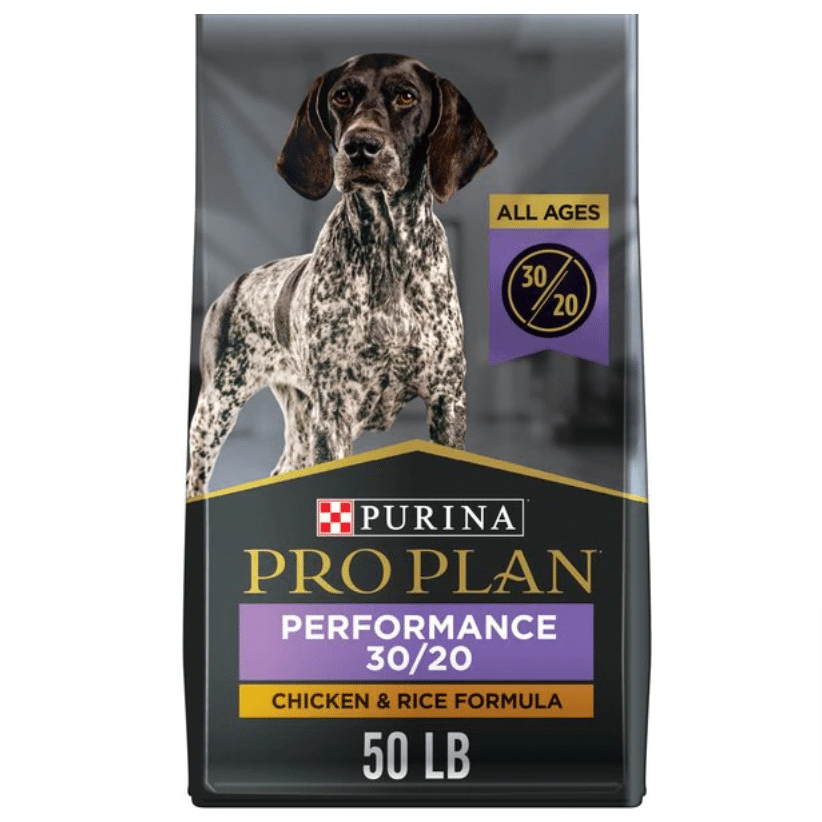
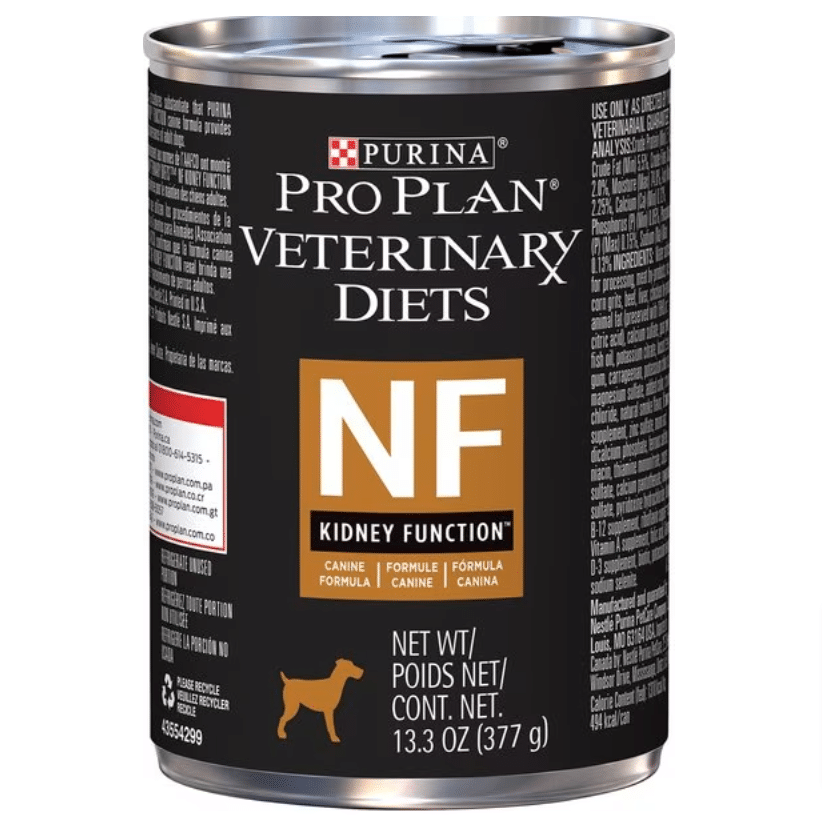
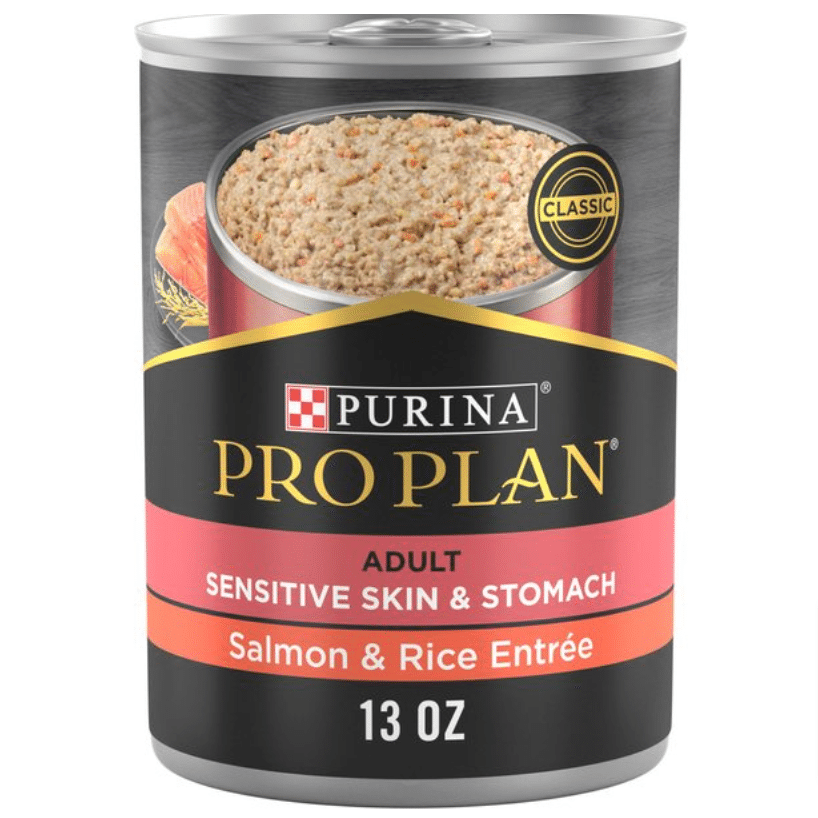
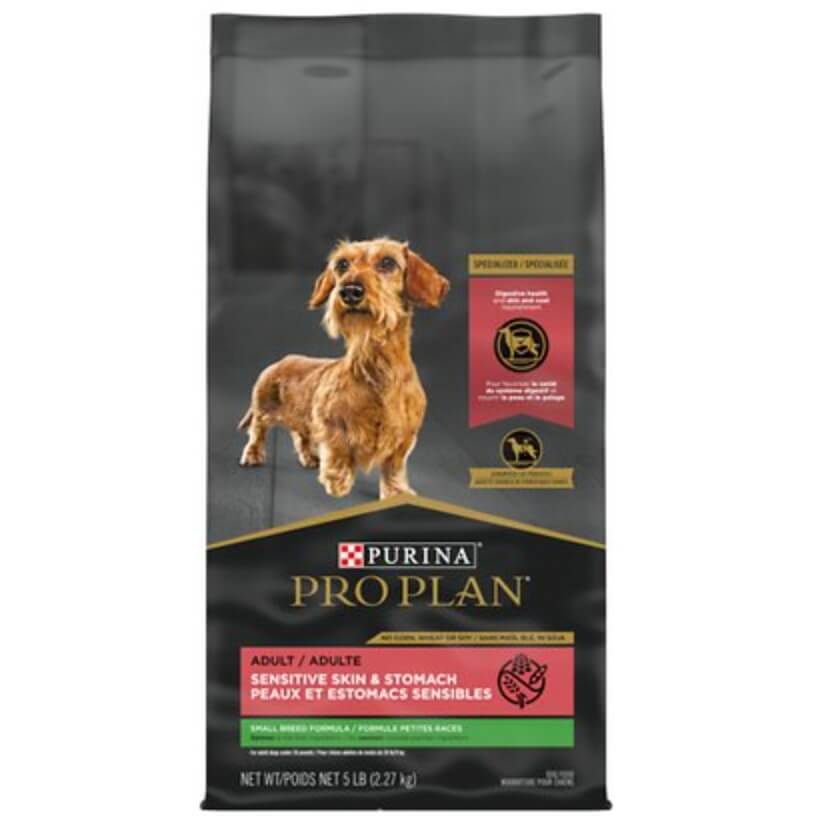
Also, they have low calorie, low fat, grain-free, and high-protein formulas. Moreover, in case your Labradoodle has any sensitivity, weight, allergy, or other health issues, the Purina Pro Plan product range has got you covered.
What’s great about their products is that they use many different protein and grain sources. So, if your Labradoodle is struggling with a food allergy, you might not have to switch to another brand altogether. Instead, you can switch the chicken formula for lamb or fish, for example. The same goes for grains.
The Purina Pro Plan Adult Shredded Blend Chicken & Rice Formula Dry Dog Food is suitable for larger sized breeds. This makes it perfect for all Labradoodles weighing more than 70 pounds.
Chicken is listed as the first ingredient and the total protein content is 26%. Although the list is not short and has some rather tricky names listed, it does contain a lot of vitamins and minerals, and even added glucosamine, which is great for Labradoodles who are at a risk of developing joint problems like hip dysplasia.
It also contains a decent amount of fats like fish oil, and vitamin A that help to keep your Doodle’s skin and coat healthy. Labradoodle owners know how important a beautiful coat is! Additionally, there’s fiber, prebiotics, and probiotics that are all crucial for good digestion.
Pros
- Contains different sources of glucosamine, which is essential for Labradoodles’ joints, as they are prone to hip and elbow dysplasia
- Uses whole grains
- First ingredient listed is chicken
- Contains a ton of added vitamins and minerals
- Fortified with fiber, prebiotics, and probiotics for good digestion
Cons
- Contains mono- and dicalcium phosphate. Dicalcium phosphate (DCP) has been linked to kidney stones and the calcification of soft tissue
- Contains soy, which may be difficult to digest, cause bloat and gas, and trigger allergies
The Verdict
Best For: Large-sized Labradoodles
Age: Adult
Special Considerations: Fortified with live probiotics and joint supporting supplements
First 3 Ingredients: Chicken, rice, whole grain wheat
2. Fromm
Fromm has formulas for all stages of life, large and small breeds, for weight management, and offers grain-free and grain-inclusive variations. The main sources of protein are beef, chicken, turkey, duck, pork, salmon, tuna, lamb, goose, pheasant, quail, venison, rabbit, and whitefish.
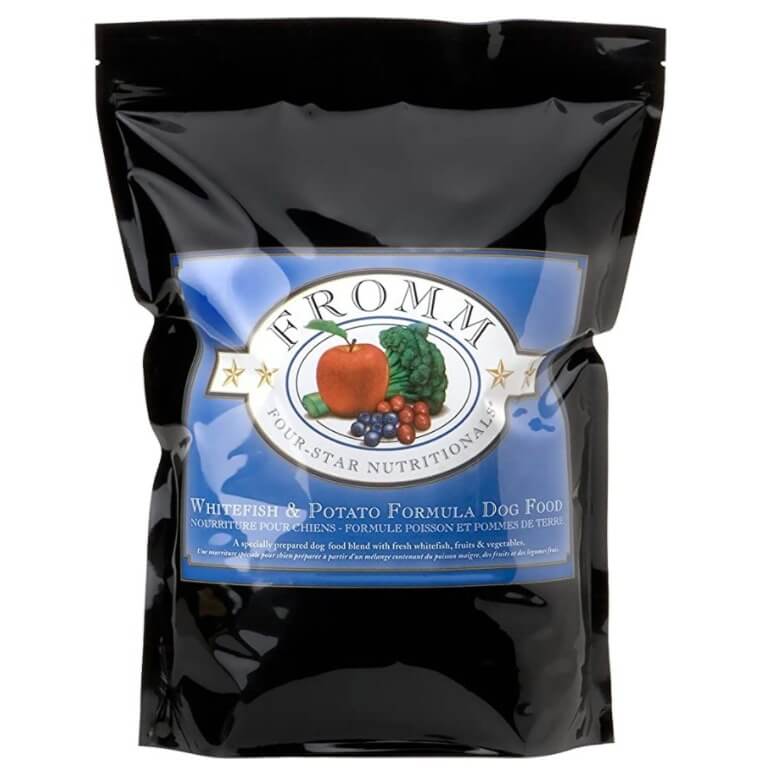
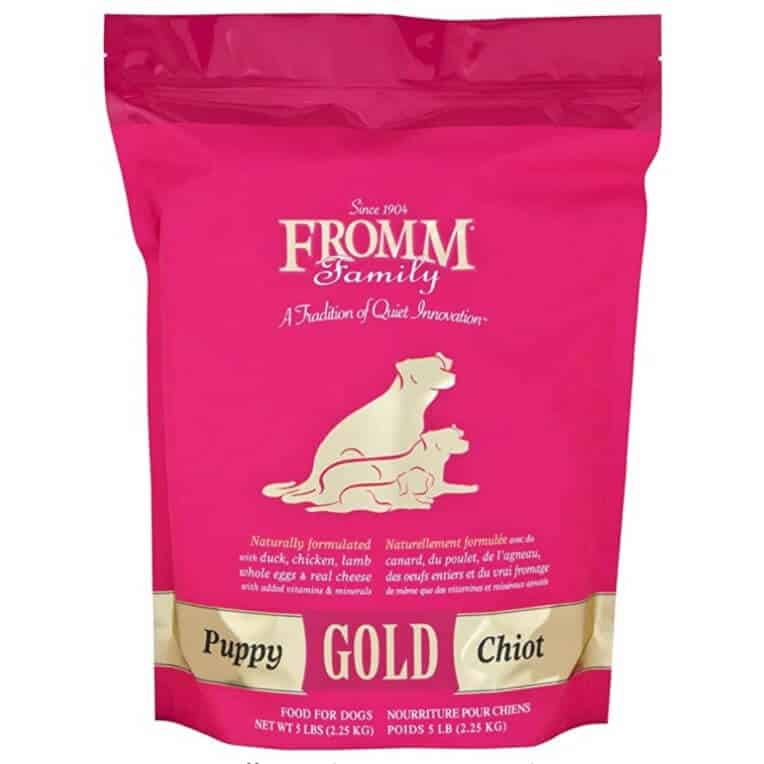
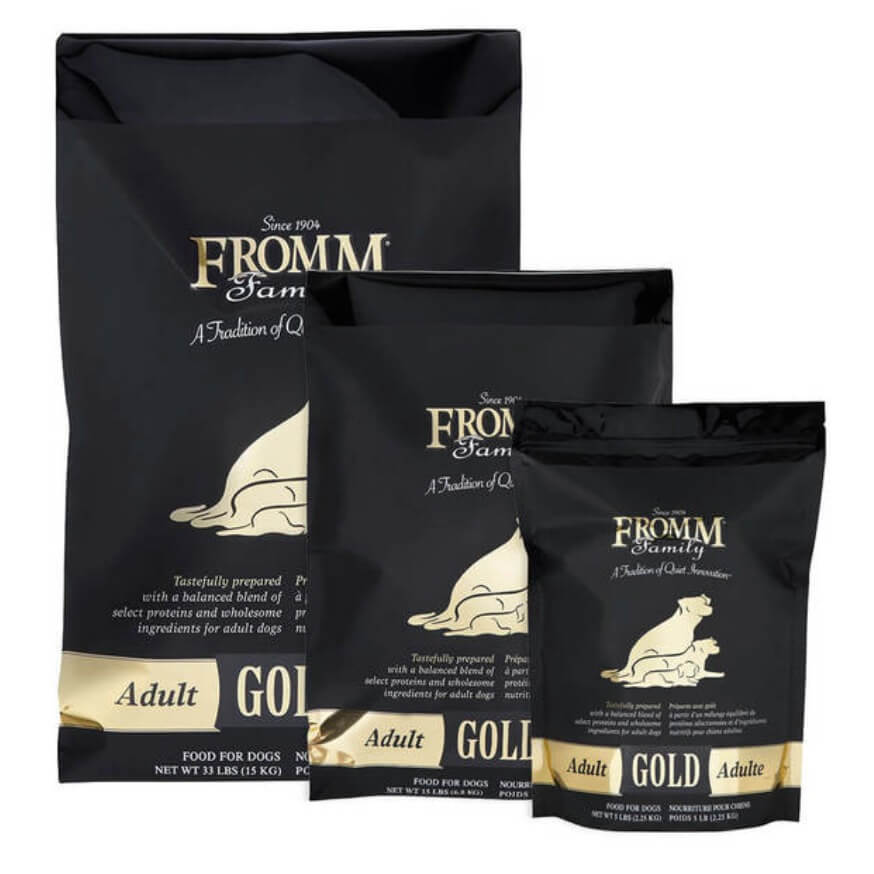
Fromm Adult Gold dry dog food is formulated for normally active adult dogs. Chicken is listed as the first ingredient, but it also includes fish meal, duck, lamb, and chicken liver. Fatty acids from salmon oil, flaxseeds, and chicken fat make up for about 16% of fat in the formula.
This formula is grain-inclusive and uses whole grains like oat groats and barley. Both of these are great sources of fiber and help support your Labradoodle’s digestion. Likewise, other natural ingredients like flaxseed, alfalfa meal, and inulin provide additional fiber.
Not only are the most important vitamins and minerals included, this dry dog food is formulated with prebiotics and probiotics.
Pros
- Short and simple ingredient list that’s easy to understand
- Uses salmon oil that’s great for a healthy coat and might also help with allergies
- Contains flaxseeds
- Contains oat groats and barley that both are great sources of fiber
- Uses natural sources of prebiotics like inulin
Cons
- Contains brewers yeast, which does contain a lot of nutrients, but might trigger an allergic reaction in some Doodles
- This formula uses cheese, which may not be suitable for Labradoodles with lactose intolerance
The Verdict
Best For: Normally active Labradoodles
Age: Adult
Special Considerations: Added salmon oil for a shiny and healthy coat
First 3 Ingredients: Chicken, chicken meal, chicken broth
3. pawTree
PawTree is a premium pet food brand that doesn’t compromise on quality. With the help of veterinarians and pet nutritionists, they’ve come up with some amazing food recipes, treats, and supplements for dogs and cats. PawTree formulas are made from real ingredients and they offer a variety of different formulas, specializing in grain-free recipes, and formulas that are free from certain ingredients to minimize allergic reactions.
Allergies and food sensitivities are a common concern for many Labradoodles, especially when it comes to certain proteins or even grains. Being mindful of our more sensitive Doods, we decided to feature this Real Duck & Chickpeas Recipe that’s ideal for Labradoodles who are allergic to chicken or fish, or who don’t tolerate grains that well.
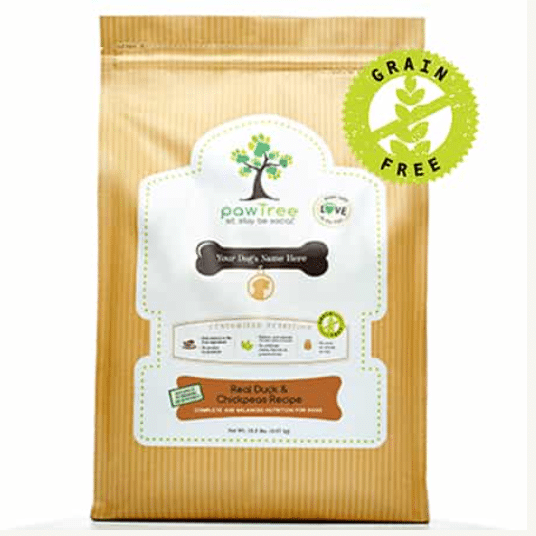
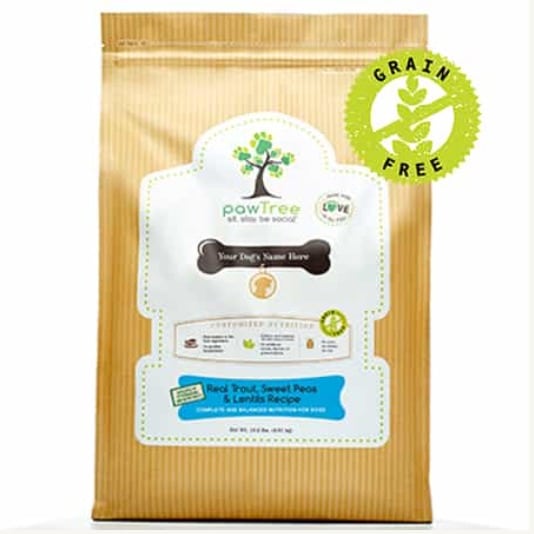
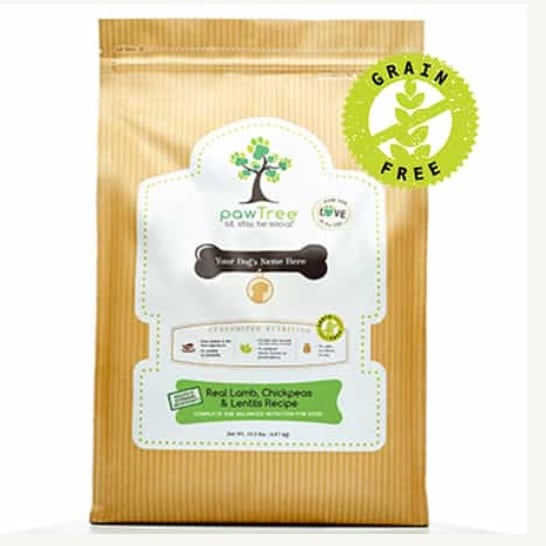
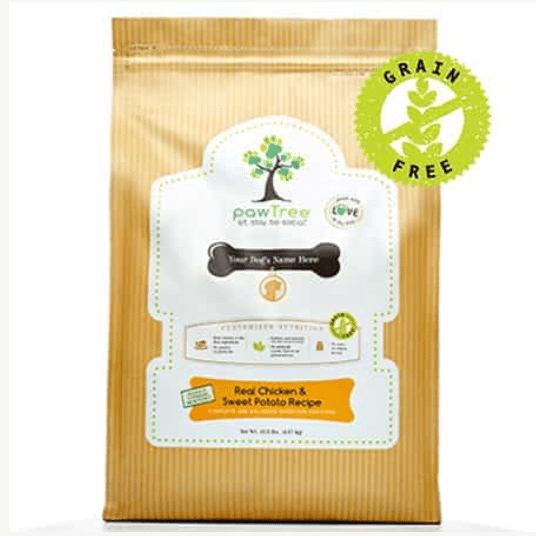
This nutritious blend of real duck, turkey, chickpeas, and sweet potato is made with a wide range of healthy fruit and veggies. Other highlights in this formula include apples, blueberries, coconut oil, salmon oil, and flaxseed. It’s an excellent source of natural omega-3 and omega-6 fatty acids that promote skin, coat, and brain health.
In addition to quality animal proteins and plants, this dry kibble also contains added vitamins, minerals, and even prebiotics for good tummy health. There’s also a good amount of glucosamine in this formula that helps support your pup’s joints and bones, and taurine that’s excellent for heart health.
As the crude fiber content in this formula is up to 4%, this recipe can be suitable for pups who need to eat a low residue diet. In fact, this recipe has been designed for reduced stool volume (and also to keep those smelly farts at bay).
Pros
- First ingredient listed is real duck.
- Packed with nutritious ingredients that are rich in vitamins, minerals, and antioxidants.
- Perfect for Labradoodles who are allergic to chicken and fish.
- Ideal for overweight Doods.
- Supports good skin and coat health.
- Naturally occurring glucosamine helps support the joints.
- Designed to be easily digestible.
- No corn, wheat, soy, poultry by-products, or artificial colors, flavors, or preservatives.
Cons
- None!
The Verdict
Best For: Overweight Doods who are allergic to chicken or fish, as well as grains
Age: Adult or older dogs
Special Considerations: Grain-free formula
First 3 Ingredients: Duck, turkey meal, dried chickpeas
4. Victor
Victor Pet Food has formulas suitable for all life stages. Additionally, they offer special formulas for joint health, weight management and performance, and grain-free and high-protein formulas.
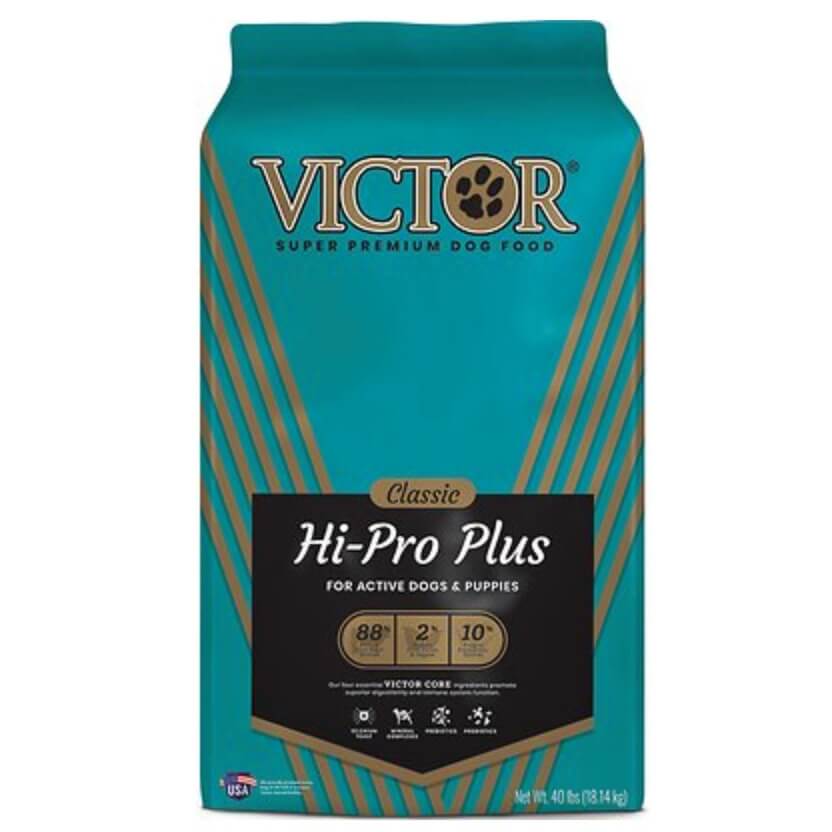
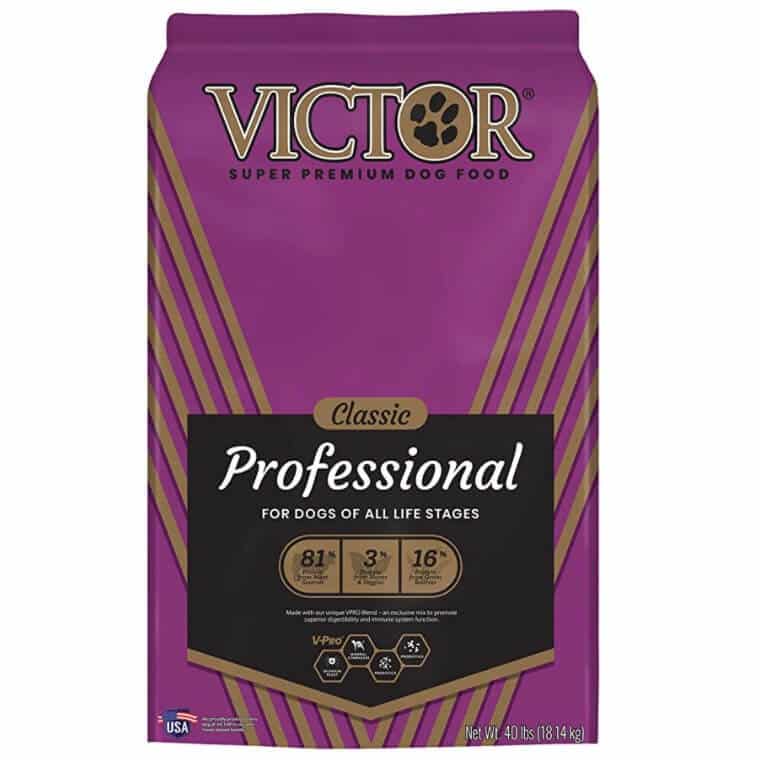
The Victor Hi-Pro Plus dry kibble formula is suitable for all life stages. As it does have a higher protein content of about 30%, this formula will work great for pregnant and nursing Labradoodles, puppies, and dogs with high energy levels.
Since this formula is nutrient dense and higher in calories, we don’t recommend this for less active and older Labradoodles. Excess body weight can put too much strain on Labradoodles’ joints and cause other health problems.
Pros
- Higher protein content, which makes it suitable for active dogs, Labradoodle puppies, and pregnant or nursing Doodles
- 88% of the protein in this formula comes from meat
- Contains the whole grain sorghum, which is high in antioxidants, B vitamins, iron, zinc, niacin, and fiber
- Uses gluten-free grains
- Contains Fructooligosaccharide, which acts as a prebiotic and also improves the absorption of minerals
Cons
- High fat content of about 20%, which may trigger tummy issues in Labradoodles with sensitive stomachs
- Not suitable for senior or less active Labradoodles, as it may lead to weight gain
The Verdict
Best For: More active Labradoodles, growing puppies, and pregnant or nursing Labradoodle mamas
Age: All life stages
Special Considerations: Nutrient dense and high-calorie formula
First 3 Ingredients: Beef Meal, Grain Sorghum, Chicken Fat
5. Science Diet
Hill’s Science Diet has a huge variety of formulas for different life stages, breed sizes, and special care formulas. For some Labradoodles, the food sensitivity, digestion, weight management, and joint support formulas might be beneficial.
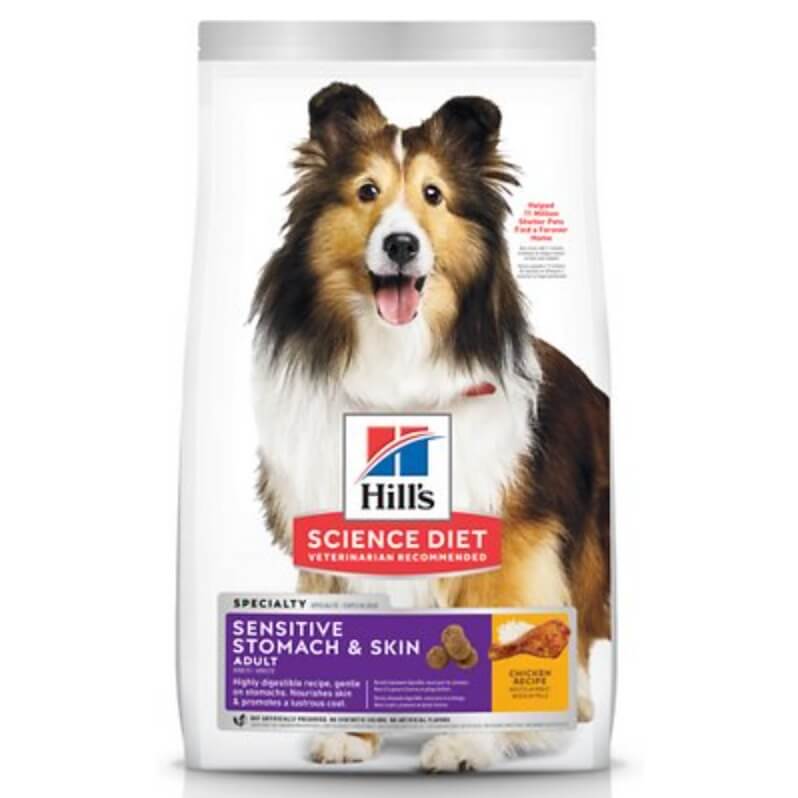
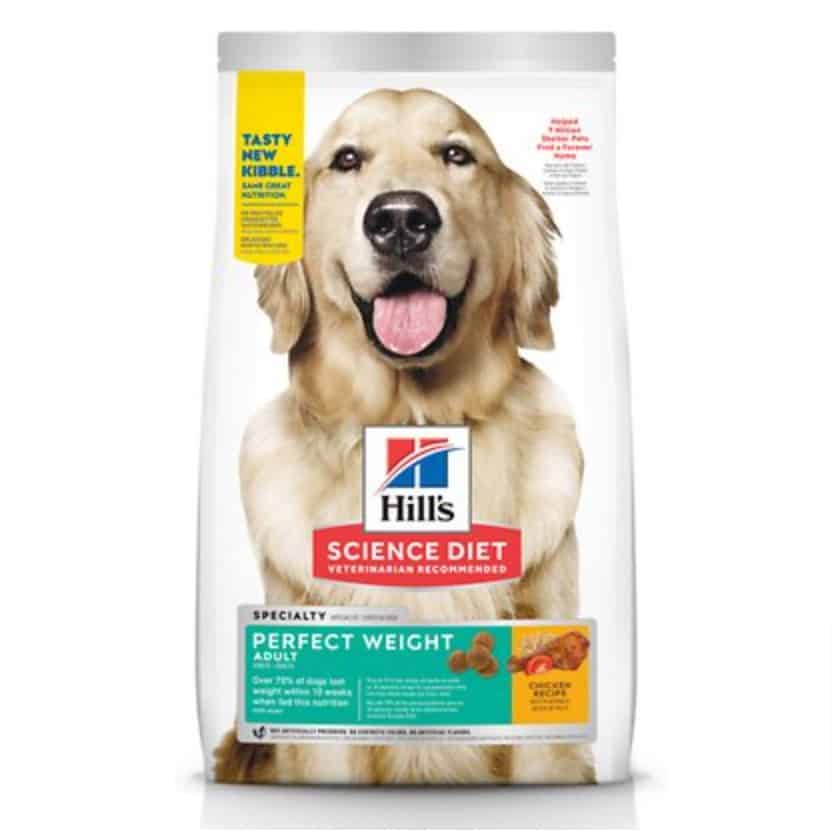
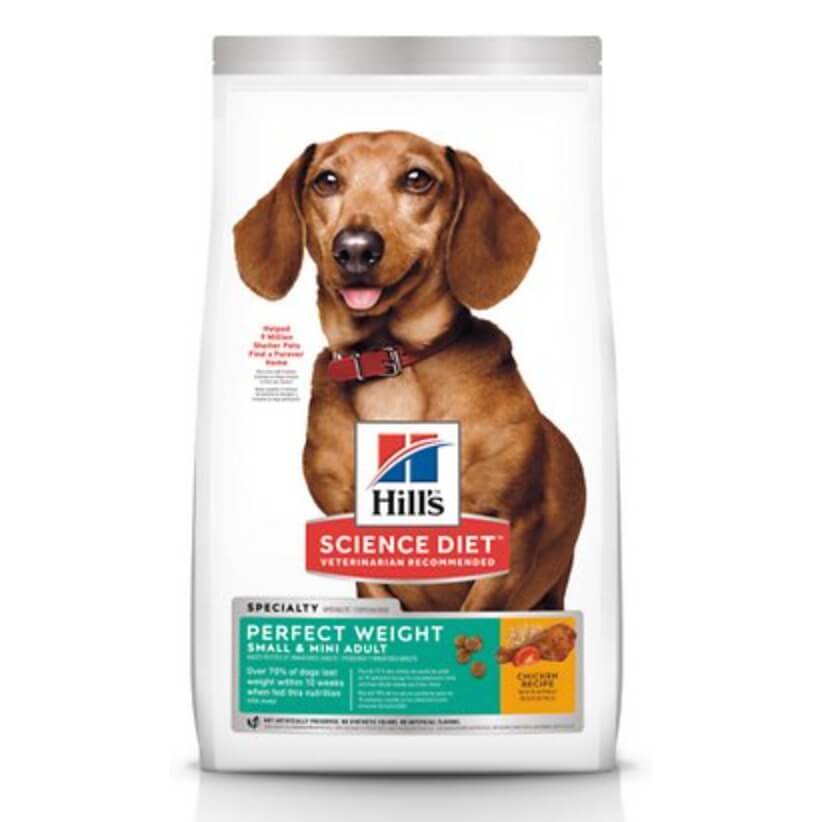
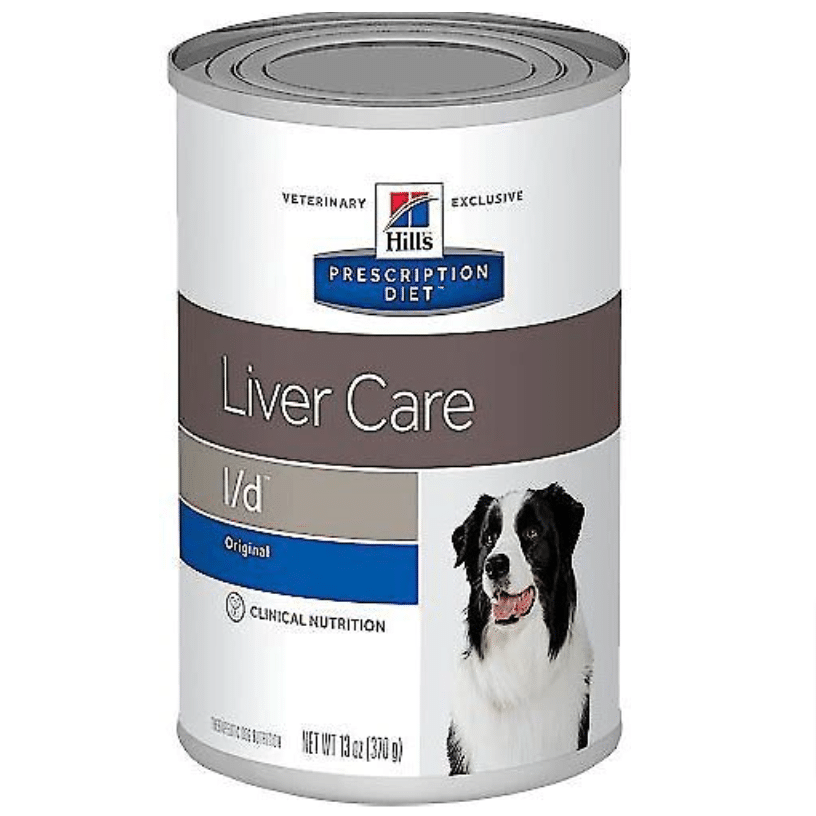
Hill’s Science Diet Adult Chicken & Barley Recipe dry dog food contains an adequate amount of protein, fat, fiber, vitamins, minerals, and omega-3 and omega-6 fatty acids. It also contains ingredients like beta-carotene, broccoli, and carrots, which all support your Labradoodle’s eye health.
Pros
- Contains flaxseed, which provides fiber for good digestion, and also essential fatty acids
- Chicken is listed as the first ingredient
- Added vitamins and minerals like vitamin A, B, C, D and E, potassium, calcium and zinc
- Made with natural ingredients
- Keeps your Labradoodle’s coat beautiful thanks to the added vitamin E and omega fatty acids
Cons
- Not suitable for Labradoodle puppies or pregnant and nursing Doodles
- Contains soybean meal, which can trigger allergic reactions in some Labradoodles
The Verdict
Best For: Normally active Labradoodles to maintain lean muscle mass
Age: Adult dogs 1-6 years of age
Special Considerations: Features an exclusive blend of fatty acids for a shiny coat in just 30 days
First 3 Ingredients: Chicken, Cracked Pearled Barley, Whole Grain Wheat
6. Royal Canin
Royal Canin offers formulas that many Labradoodle owners might find useful like special food for large breeds, formulas for food sensitivities, weight management, and digestive health. (All of which Labradoodles are at risk of.)
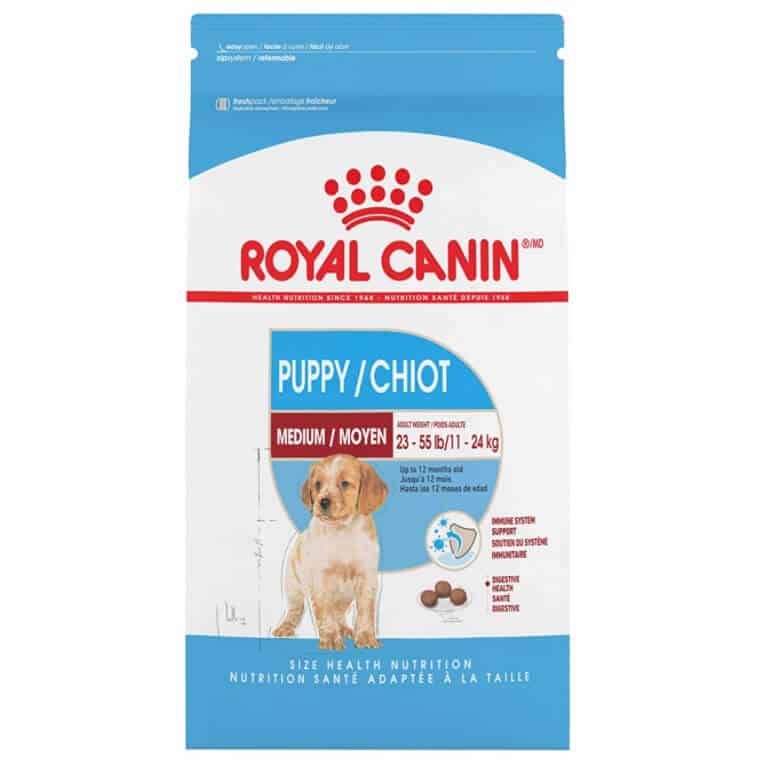
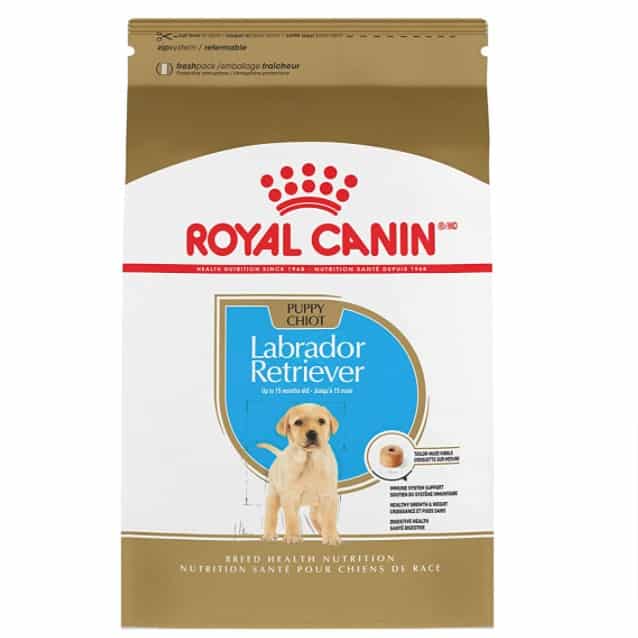
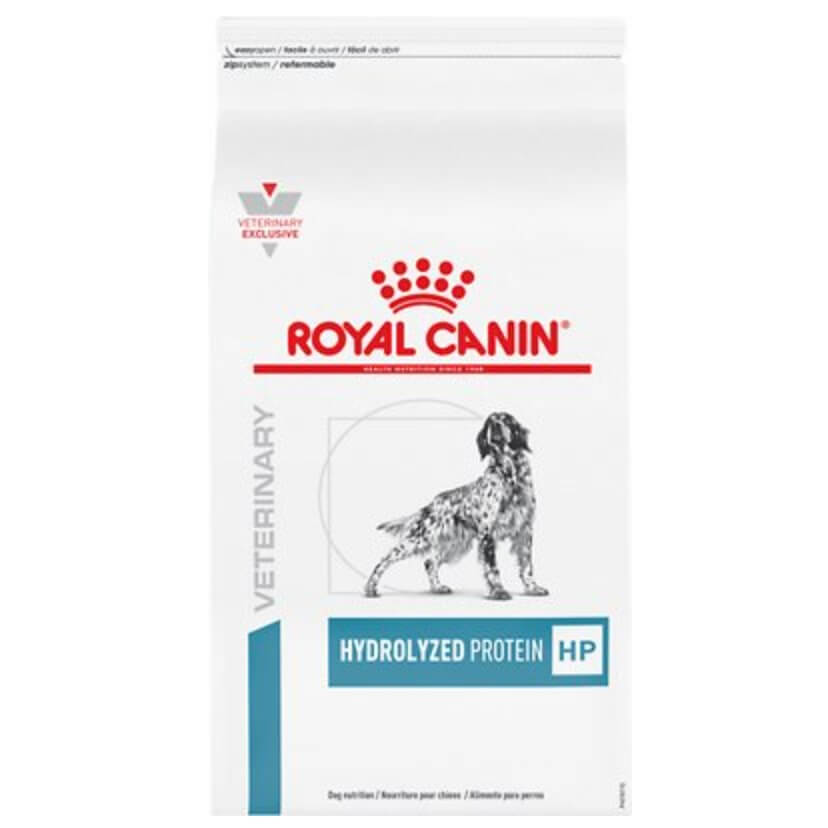
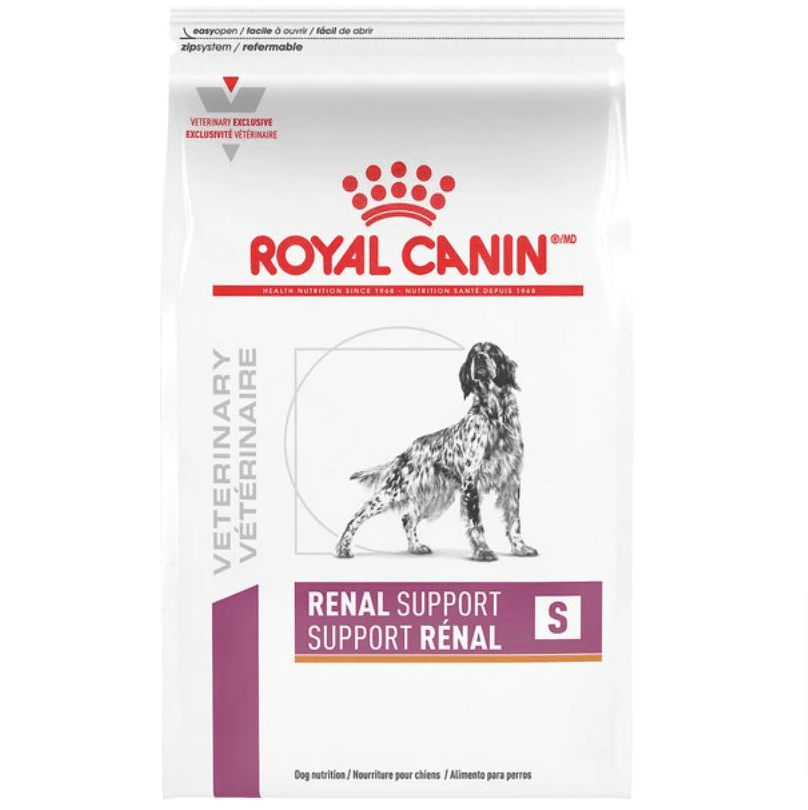
Royal Canin Labrador Retriever Puppy dry dog food is specially formulated for 3-15 month old Labrador Retrievers. However, as Labradoodles tend to inherit the health issues of both Labs and Poodles, this option might work well for your Labradoodle.
Pros
- Takes into consideration the health issues from the Labrador Retriever parent’s side
- Contains prebiotics for proper digestion
- Formulated specially to promote healthy growth rate and weight management
- Added glucosamine that supports your Labradoodle’s joints
- Contains psyllium husk, which is an excellent source of fiber and helps with digestion
Cons
- May trigger allergies as it uses corn gluten meal and wheat gluten
- Contains sodium tripolyphosphate (STPP), which is a mild skin irritant
The Verdict
Best For: Energetic Labradoodle puppies
Age: 2-15 month old puppies
Special Considerations: Specialized kibble to prevent your puppy from eating too quickly
First 3 Ingredients: Chicken by-product meal, brewers rice, brown rice
7. Diamond
As with other brands, Diamond offers a variety of dog food options for different needs. Labradoodle owners might find their formulas for weight management or sensitivity issues helpful.
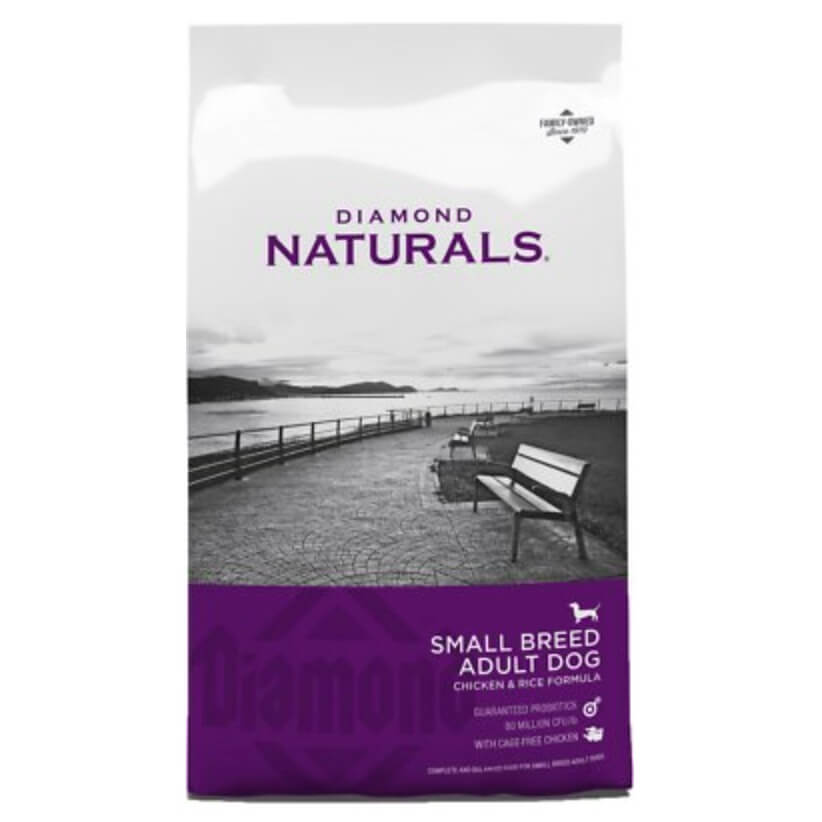
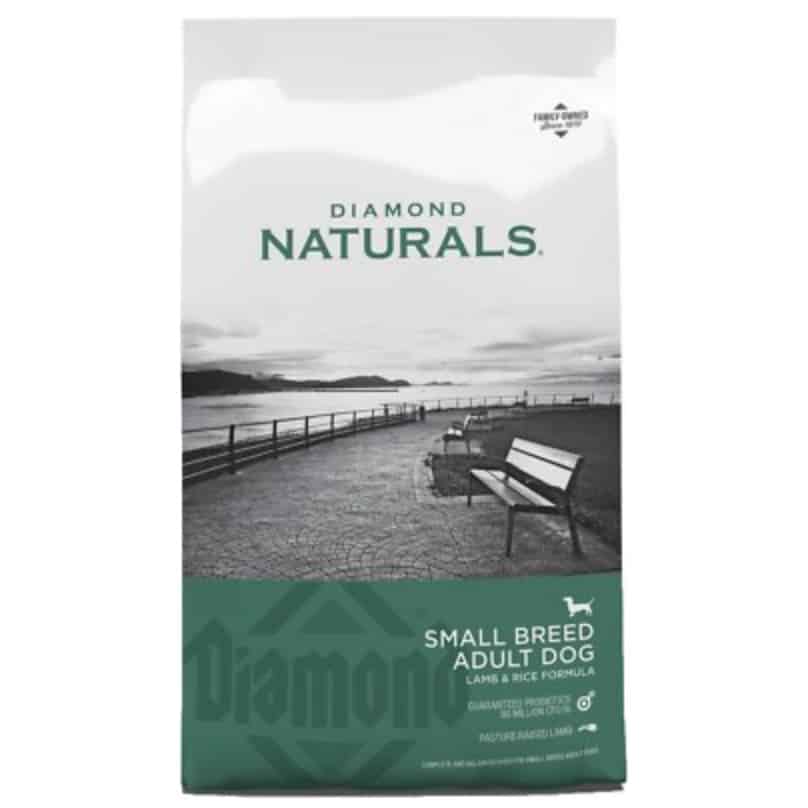
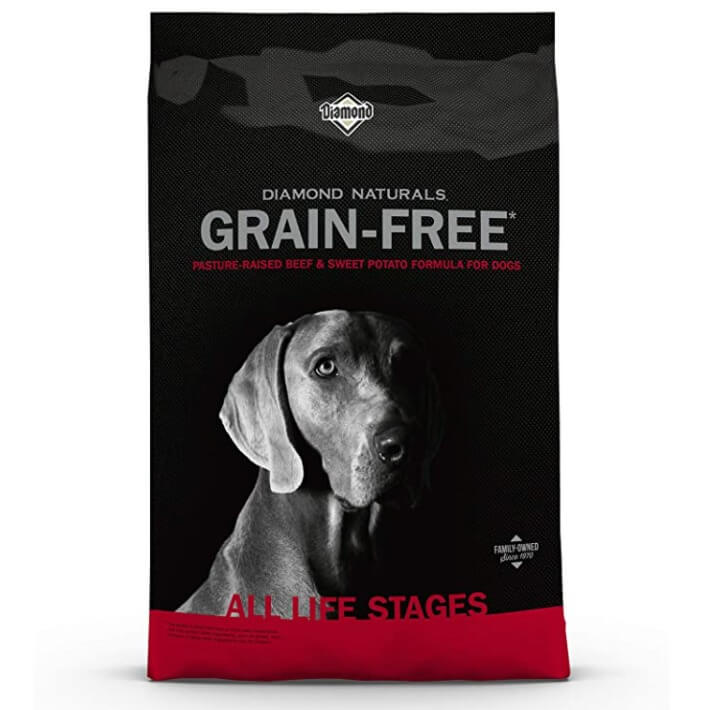
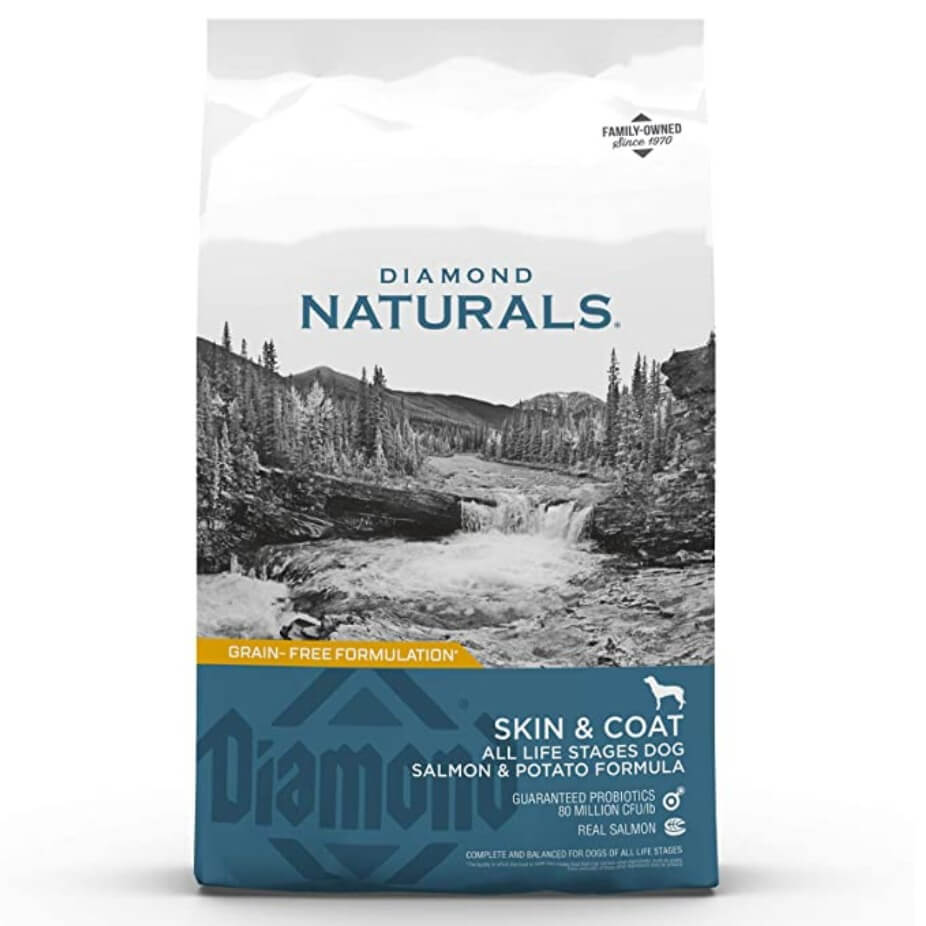
Diamond Naturals Beef Meal & Rice Formula Adult Dry Dog Food is designed for moderately active dogs. It contains vitamins like Vitamin A, B12, D, and E. It contains a decent amount of fiber that helps with proper digestion, as do added probiotics. In addition, omega fatty acids help keep your Labradoodle’s skin and coat healthy.
Pros
- Contains omega fatty acids
- Contains probiotics for better digestion
- Dried beet pulp and wheat flour provide additional fiber
- Suitable for dogs who aren’t super active
Cons
- None
The Verdict
Best For: Moderately active Labradoodles
Age: Adult
Special Considerations: Features specific probiotics, prebiotics, and fiber to support healthy digestion
First 3 Ingredients: Beef meal, grain sorghum, ground white rice
8. Raw/Homemade Food
Raw and homemade dog food is widely popular, yet a bit of a controversial topic – especially raw dog food. Of course, the great thing about both raw and homemade dog food is that you’ll have a complete control over what your Labradoodle eats and where everything comes from. However, there is a risk that you won’t be able to balance all the nutrients that your Doodle needs.
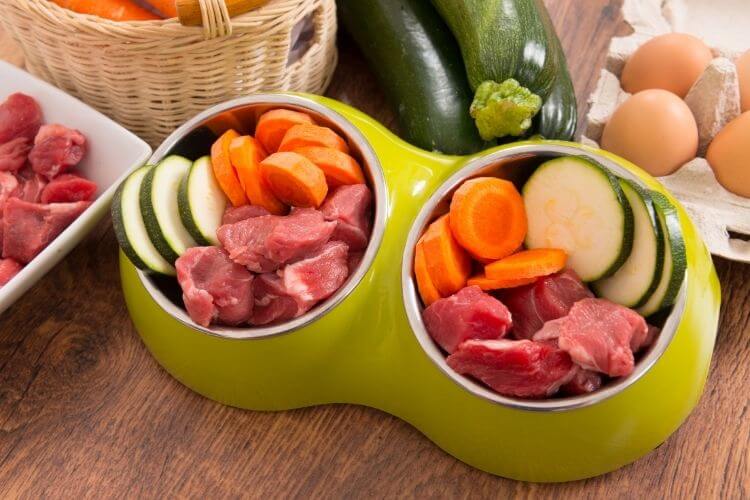
For example, the ratios for each food group in the Biologically Appropriate Raw Foods (BARF) model are: 70% muscle meat, 10% raw edible bone, 7% vegetables, 5% liver, 5% other secreting organs, 2% seeds and nuts, 1% fruit.
The key ingredients in raw dog food diets are: muscle meats, organ meats like liver, kidney, spleen, brain, sweetbreads, whole, powdered or meaty bones, raw eggs, dog-friendly fruit and vegetables, and sometimes dairy, like yogurt.
Pros
- Being able to control every single ingredient
- No artificial ingredients and harmful additives
- Fresh, whole food
- You can prepare just one serving to see if there are any ingredients your Labradoodle doesn’t tolerate or like, so there won’t be any waste if they can’t eat it
Cons
- If the nutrient profile is not balanced, your Doodle might develop nutrient deficiencies or excesses
- It is more time consuming to prepare all the meals yourself
- Risk of contamination if not stored properly or infections due to different kinds of pathogens and bacteria from uncooked raw meats
9. Kirkland
Kirkland is another popular dog food brand that Labradoodle parents love. It offers formulas for all life stages, weight management, and also grain-free and organic options.
Kirkland Signature Super Premium Adult Dog Chicken, Rice & Vegetable Formula dry dog food contains fresh chicken and egg, joint supplements, prebiotics, probiotics, and fiber – all of which are key nutrients in a high-quality Labradoodle dog food.
Pros
- Added glucosamine and chondroitin for healthy joints
- Contains probiotics, prebiotics, and fiber that support your Labradoodle’s digestion
- Includes both omega-6 and omega-3 fatty acids
- Contains carrots and vitamin A that are great for eye health
- Uses brown rice, which is less processed and has more nutrients
Cons
- Contains brewers yeast, which may trigger allergies in some Labradoodles
- This formula contains chicken as the main ingredient, which some Labradoodles are allergic to. However, they do have other formulas with different protein sources
The Verdict
Best For: Moderately active Labradoodles
Age: Adult
Special Considerations: Contains joint supporting glucosamine and chondroitin as well as live cultures for good digestion
First 3 Ingredients: Chicken, chicken meal, whole grain brown rice
Key Nutritional Needs of Labradoodles
Labradoodles, just like all other dogs, need a diet that includes a variety of foods and nutrients. The best dog food for Labradoodle consists of a high-quality protein, carbohydrates, some fat, fiber, vitamins, and minerals.
Protein
Meat, poultry, or fish are all great protein sources that should be listed as the first ingredient in dog food formulas. Protein is crucial for your Doodle’s muscles, especially for Labradoodle puppies when they’re still growing.
The AAFCO Nutrient Requirement for Dogs states that puppies need at least 22% protein in their diet, and adult Labradoodles should get at least 18% protein.
Carbohydrates
Also, high-quality carbohydrates can provide an additional support to your Doodle’s health. Ideally, the best dog food for Labradoodle contains whole grains, as they are less processed and include more fiber and nutrients.
Nevertheless, some Labradoodle owners choose to opt for grain-free dog foods. For instance, if a dog suffers from a food allergy due to some type of grain. The culprits are usually grains that are higher in protein like wheat and soy.
If you haven’t yet heard, an FDA study showed that there might be a link between grain-free diets and heart problems in dogs. Read our article about whether grain-free diets for are good or bad for Doodles.
Fats
Fat is another important macronutrient that should be included in your Labradoodle’s diet. Not only does it improve the taste of dog food, but also provides your Labradoodle essential fatty acids that are necessary for many different physiological processes. Fatty acids help your Doodle’s body absorb other nutrients better. They also provide support for your Labradoodle’s hair, skin, eyes, and organs.
The AAFCO requires that puppy food contains at least 8% fat for growth and reproduction, and 5% for adult dogs.
Other Key Ingredients In Labradoodle Dog Food
Another key ingredient in Labradoodle dog food is fiber. It’s essential for the normal functioning of your Doodle’s digestive system. Fiber can be helpful for both constipation and diarrhea, as it helps bulk up the stool and pass along the digestive system. Fiber also has benefits on the overall health of your Labradoodle.
Likewise, vitamins, minerals, and other supplements are crucial for your Labradoodle’s health and wellbeing. These include calcium, magnesium, potassium, sodium, iron, zinc, taurine, glucosamine, folic acid, vitamins A, B, C, D, E, K, and more.
Of course, a commercial dog food should consist of high-quality ingredients anyway. But, some vitamins and minerals should be added for an all round support for your Doodle’s health. In addition, as you may know, many dog food brands offer dog foods for special needs, life stages, and breed sizes. This ensures that your Labradoodle gets all the important nutrients in the right amounts based on their own unique needs.
Common Health Issues of Labradoodles & How Specific Foods Help Them
Even though Labradoodles are considered healthier than their purebred Labrador Retriever and Poodle parents, they are still at risk of developing hereditary health issues. Let’s have a look at the most common health issues that Labradoodles may experience and how specific foods can help.
Sensitive Stomachs
Labradoodles are predisposed to tummy issues. Signs of sensitivities include vomiting, diarrhea, bloating, flatulence, constipation, stomach cramps, weight loss and mucus in the stool. The best dog food for Labradoodle with a sensitive stomach might need to contain more fiber and/or less fat. Fiber helps with proper digestion, whereas too much fat can irritate your Doodle’s tummy.
In addition, Doodles can also experience a variety of food intolerances. For example, lactose intolerance.
Allergies
Both Poodles and Labrador Retrievers are prone to allergies. Therefore, keep an eye on your Labradoodle in case you notice any symptoms that might indicate an allergic reaction.
Allergy symptoms in Doodles include itchiness on skin, ears or paws, swelling, diarrhea, and more.
The most common types of allergens are protein sources like chicken, beef, and dairy. In addition, grains like wheat and corn can also act as allergens. Therefore, switching the protein or grain source could be very helpful. For instance, if your Doodle doesn’t feel well after eating dog food that contains chicken, try switching it out for lamb or fish. Same goes for grains.
Eye Diseases
Progressive retinal atrophy (PRA), cataracts, and retinal dysplasia are all hereditary diseases that can come from both the Labrador Retriever or Poodle parent’s side. Eye diseases have a progressive nature and can lead to blindness if left untreated.
The best dog food for Labradoodle at risk of eye diseases should contain vitamin A, carotenoids, antioxidants like lycopene from tomatoes, sweet potatoes, pumpkin, eggs, carrots, essential fatty acids like omega-3, or broccoli.
Joint Problems And Hip Dysplasia
Hip dysplasia (and elbow dysplasia!) is another common hereditary disease in Labradoodles. Hip dysplasia weakens the hip joints, which can result in weak limbs. Consequently, it may appear as if your Doodle has a difficult time rising up and walking.
Both Labrador Retrievers and Poodles are at a risk of developing hip dysplasia. The risk factors include excessive growth rate, being overweight, exercising too much or too little, and improper nutrition.
For instance, too much body weight puts a pressure on a Labradoodle’s joints, which in turn can cause hip dysplasia. Likewise, large Labradoodle puppies might need special large breed puppy food to avoid excessive growth and thus skeletal disorders.
The best dog food for Labradoodle who is at risk of developing hip dysplasia or joint problems should contain joint supplements like glucosamine or chondroitin. Overweight Labradoodles will also benefit from dog food specially designed for weight control.
Gas/Bloat
Bloating and Gastric Dilatation Volvulus (GDV) can be potentially life threatening if your Labradoodle hasn’t gotten immediate veterinary care. GDV is a rapidly progressive disease in which a dog’s stomach starts to dilate, twist, and trap the air inside.
As a result, the blood flow to the stomach is limited, the stomach wall may rupture and the lungs might not be able to receive enough oxygen. GDV can pose a very huge risk on a Labradoodle’s organs. In many cases, surgery is necessary.
Studies have shown that dry dog foods that list oils like sunflower oil and animal fats in the first four ingredients put dogs at a higher risk of developing GDV. (Source)
What to Look For While Choosing The Best Food For Labradoodle Puppies & Adults
First and foremost, you should feed your Labradoodle based on their size, age, and special needs. For example, Labradoodle puppies need dog food specially formulated or suitable for puppies. The best food for Labradoodle puppy has more calories and protein, and contains vital nutrients that are necessary for proper growth and development.
As you know, all dogs are unique and have their own special needs. Routine vet check-ups are an absolute must, so that you know what’s going on with your Doodle. Not to mention, when your Labradoodle is not feeling too well or acts unusual. Your vet will be able to recommend a high-quality dog food that takes your pup’s special needs into consideration.
For example, if you have a puppy who will grow into a standard Labradoodle, the food should be formulated for large breed puppies. These special formulas ensure that your Labradoodle puppy won’t grow too fast, which can cause joint problems.
Moreover, a high-quality dog food should meet the Dog Food Nutrient Profiles established by the AAFCO. You should be able to find the nutrient analysis and statement on the dog food packaging.
By the way, we’ve reviewed a ton of different dog food formulas and specialized diets, so be sure to check them out.
Ingredients To Avoid In Labradoodle Dog Food
You already might know that there are ingredients your Labradoodle should never eat. Naturally, responsible dog food brands do not include these ingredients, anyway.
However, there are other ingredients to look out for. For instance, you should avoid all dog foods that include artificial preservatives and additives like BHA and BHT in the formula.
Grain as the main ingredient and high-carb dog foods are not especially great for Labradoodles, either. The best dog food for Labradoodle should have meat or another high-quality protein source as the main ingredient.
In addition, dog foods listing gluten as one of the ingredients is not the best dog food for Labradoodle. Excess gluten can trigger food intolerances or allergies. As Labradoodles are prone to allergies and sensitivities, it’s better to avoid added gluten.
If you’re interested in learning more about dog food safety, then have a look at some of these articles we’ve prepared for you.
How To Switch Your Labradoodle’s Dog Food
Switching your Labradoodle’s food should be done gradually. Your Doodle’s digestive system might need time to adjust. And as we already know, some Labradoodles do have sensitive stomachs.
Here’s a great schedule on how to switch your Labradoodle dog food.
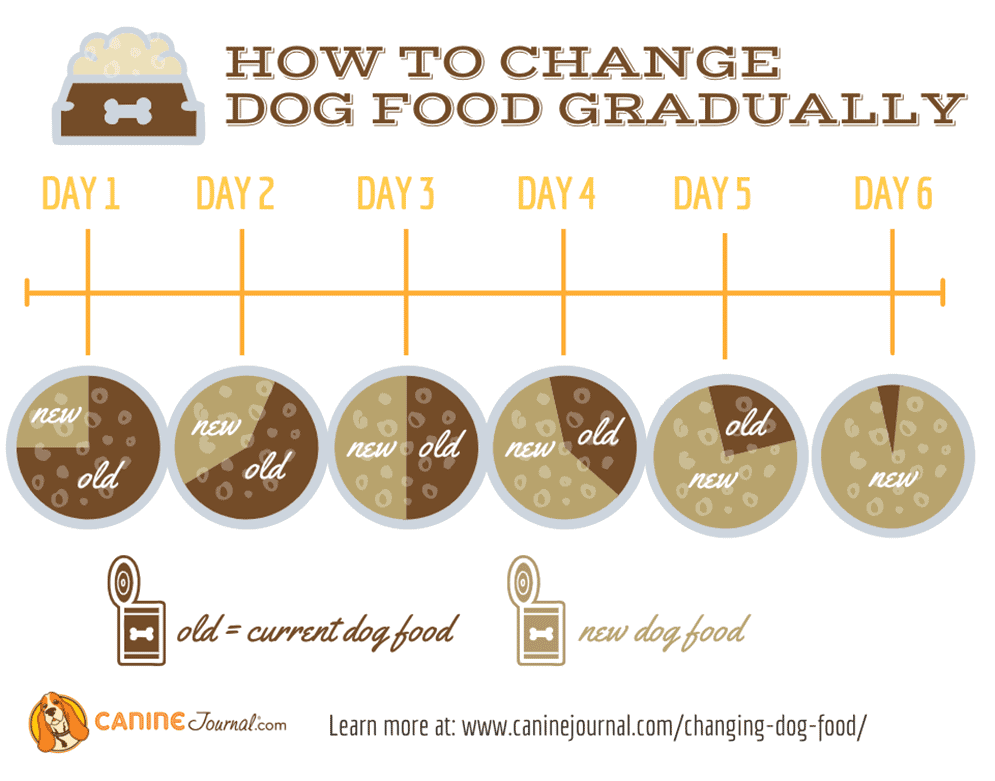
Labradoodle Feeding Chart (Puppy to Adult)
As we mentioned above, puppies have different needs when it comes to food. A puppy needs more frequent meals and more energy. Generally, they should be fed puppy food until they’ve reached their full adult size. Usually, this happens around 12-16 months of age, depending on your Labradoodle’s size.
From 8-12 weeks, puppies should be fed small portions 3-4 times a day. At 4-5 months of age, feed them puppy food 3 times daily. From around 6-8 months of age, you can start adjusting your Labradoodle pup to 2 meals a day. And finally, at around 9-16 months, most Labradoodles can switch to adult food.
Here’s our Labradoodle feeding calculator, which shows how often, how much, and what food should you feed your Labradoodle puppy.
Frequently Asked Questions On The Best Food For Labradoodles
Labradoodles are not usually very picky eaters. Like most dogs, they like to eat whatever they can munch on. Of course, there might be certain flavors that your Labradoodle just doesn’t like that much in their food. However, if your Doodle refuses to eat, pay a visit to your vet, as it may indicate a health issue.
Labradoodles, like all other dogs, should eat puppy food until they’ve reached their adult size. The Labradoodle feeding calculator we mentioned is a very useful guide. But don’t forget to visit your vet regularly and follow their exact guidelines on when to switch to adult food.
How much your Labradoodle should eat depends on their age, size, weight, activity levels, and overall health. Be sure to check out our article on this topic. (You’ll also find our Labradoodle dog food calculator there!)
Yes, Labradoodles can eat chicken. However, chicken is one of the most common triggers for food allergies in dogs, as it is very high in protein content. And as we know, Labradoodles are prone to developing allergies. If your Labradoodle dog food contains chicken and your Doodle is showing signs of an allergy, an elimination diet might be necessary. Read our article here on best chicken-free dog foods.
Labradoodles can eat both dry and canned food. Of course, some Labradoodles may prefer one over the other. Above all, the most important thing is that the formula suits your Doodle’s needs. Also, canned dog food is more expensive and naturally larger Labradoodles need more food. Therefore, a diet consisting only of canned food is not the most budget-friendly option.
So, these are the best dog food for Labradoodle dry formulas that Doodle owners have tried, tested, and loved. In conclusion, we can’t stress enough how important it is that you choose Labradoodle dog food based on your little friend’s special needs and stage of life. Whether they need weight management or support for their joints, you should always consult with your vet and find the most suitable formula.
Learn How to Care for Your Doodle Puppy!

Perfect for first-time Doodle parents, get ALL your questions answered, including questions new Doodle parents don’t even think to ask.
Plus, get $700 worth of Bonus Materials for FREE, including:- Doodle Parenthood Community and Support Group ($190 value)
- Doodle Puppy Growth Tracker ($20 value)
- EMERGENCY Cheatsheet: When To Call The Vet Immediately ($50 value)
- HELP! Button ($145 value)
- And SO MUCH MORE!
The information on this page is for informational purposes only. It is not intended to be a substitute for qualified professional veterinary advice, diagnosis, or treatment. Always seek the advice of your veterinarian or other qualified animal health provider with any questions you may have.

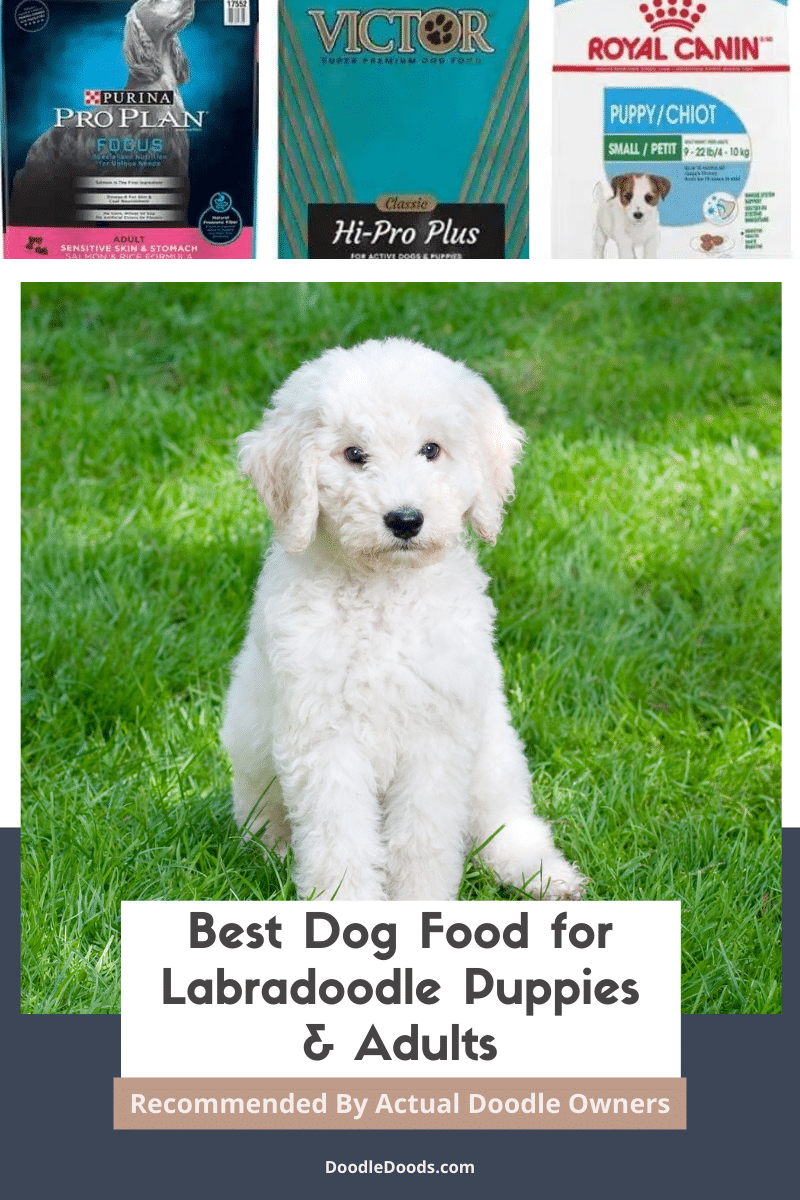
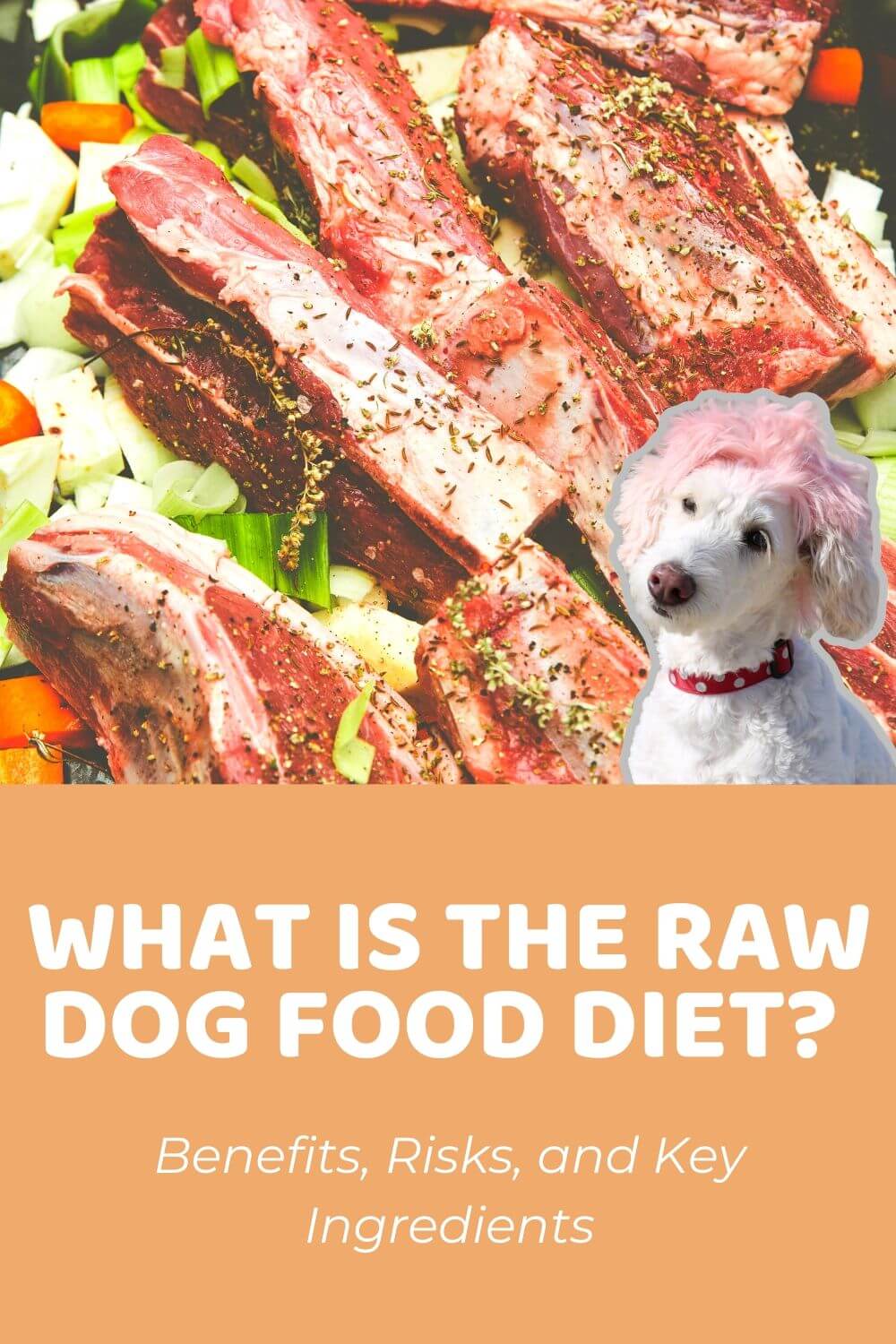
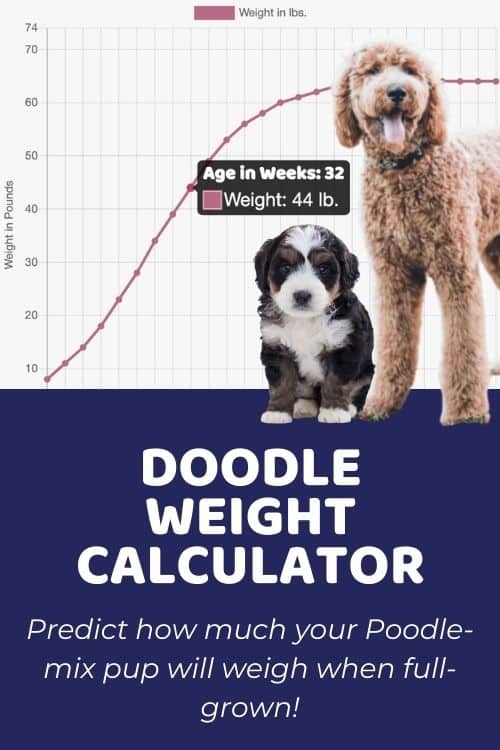
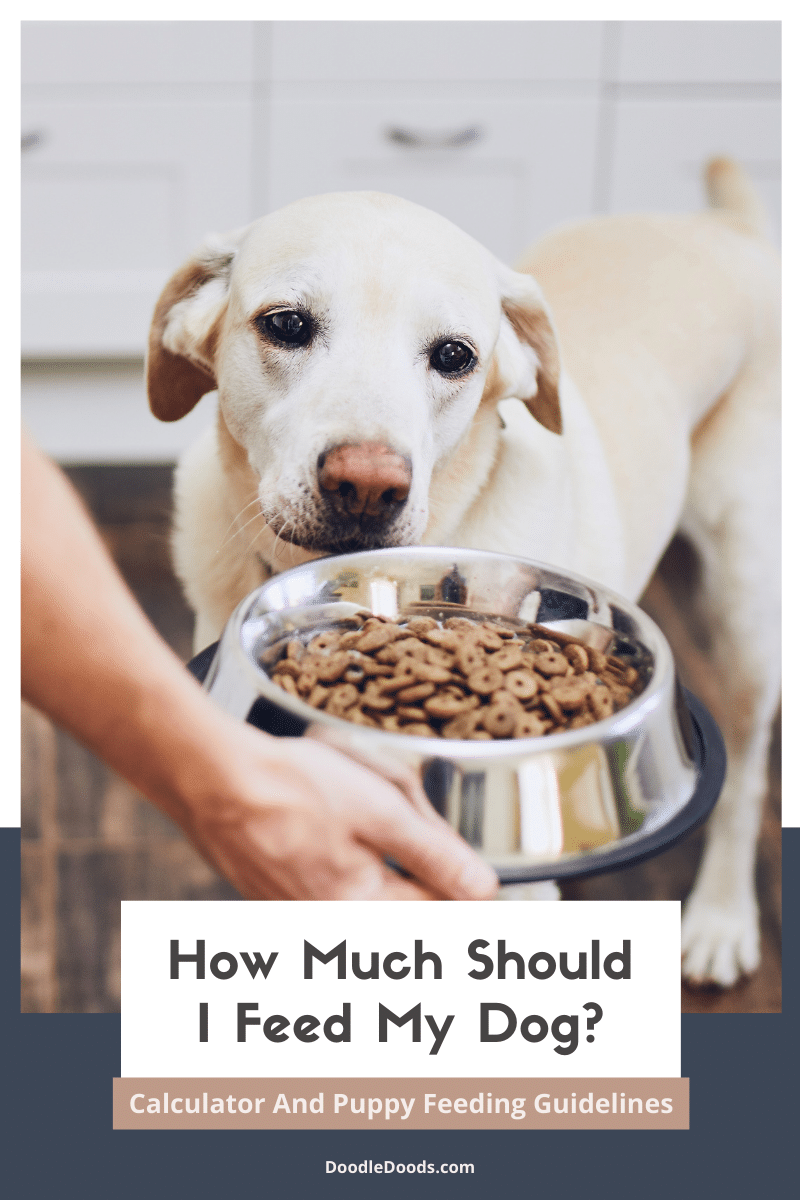
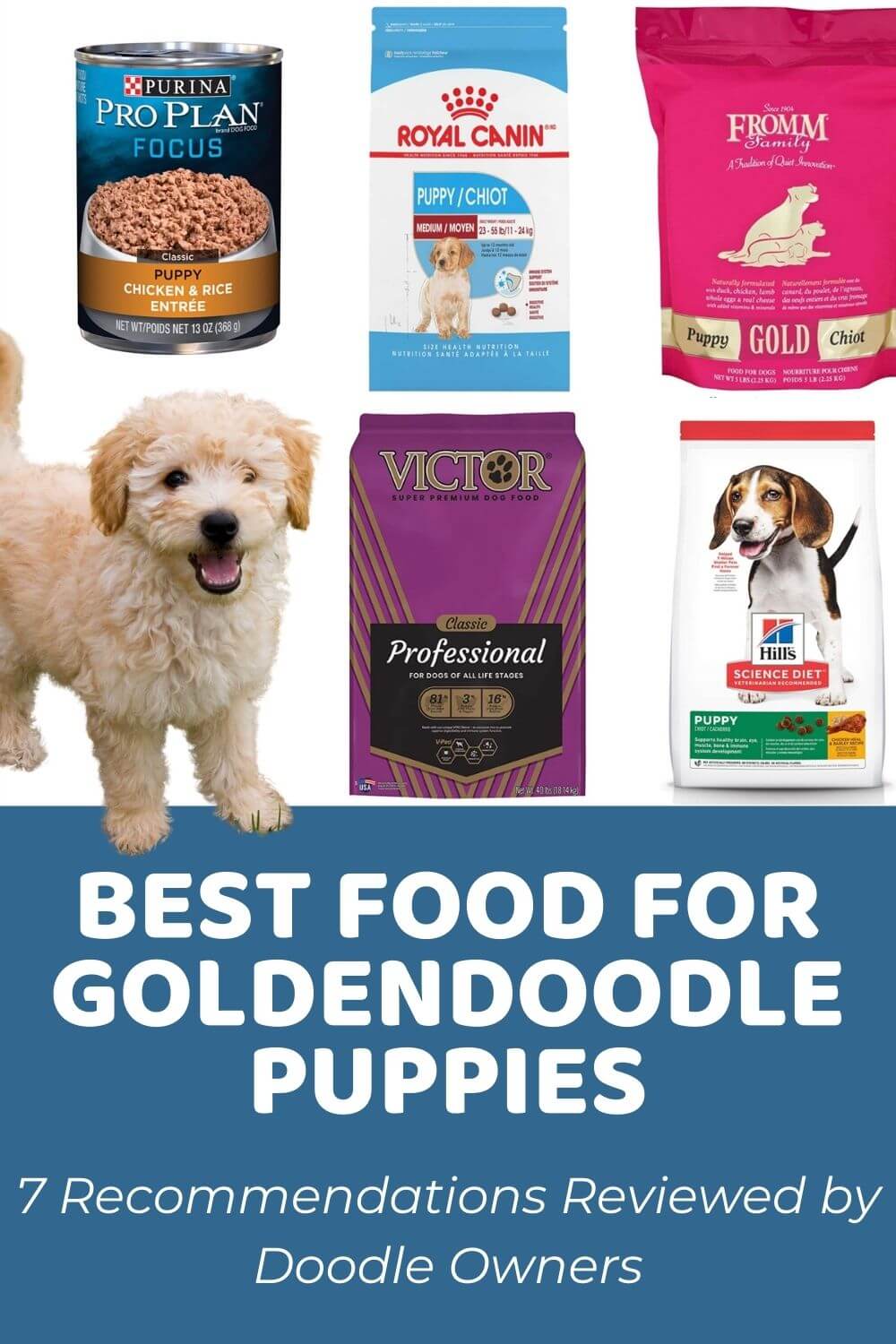
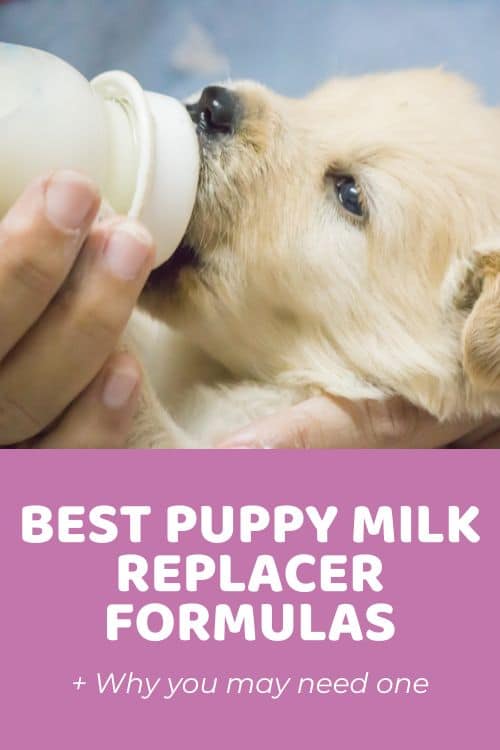
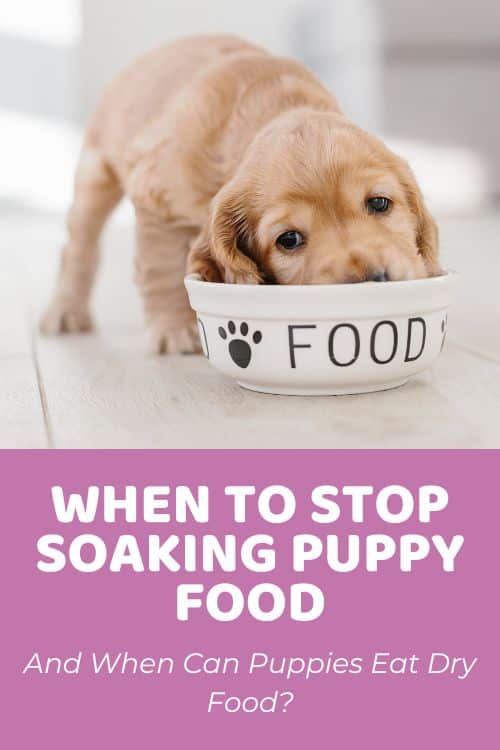
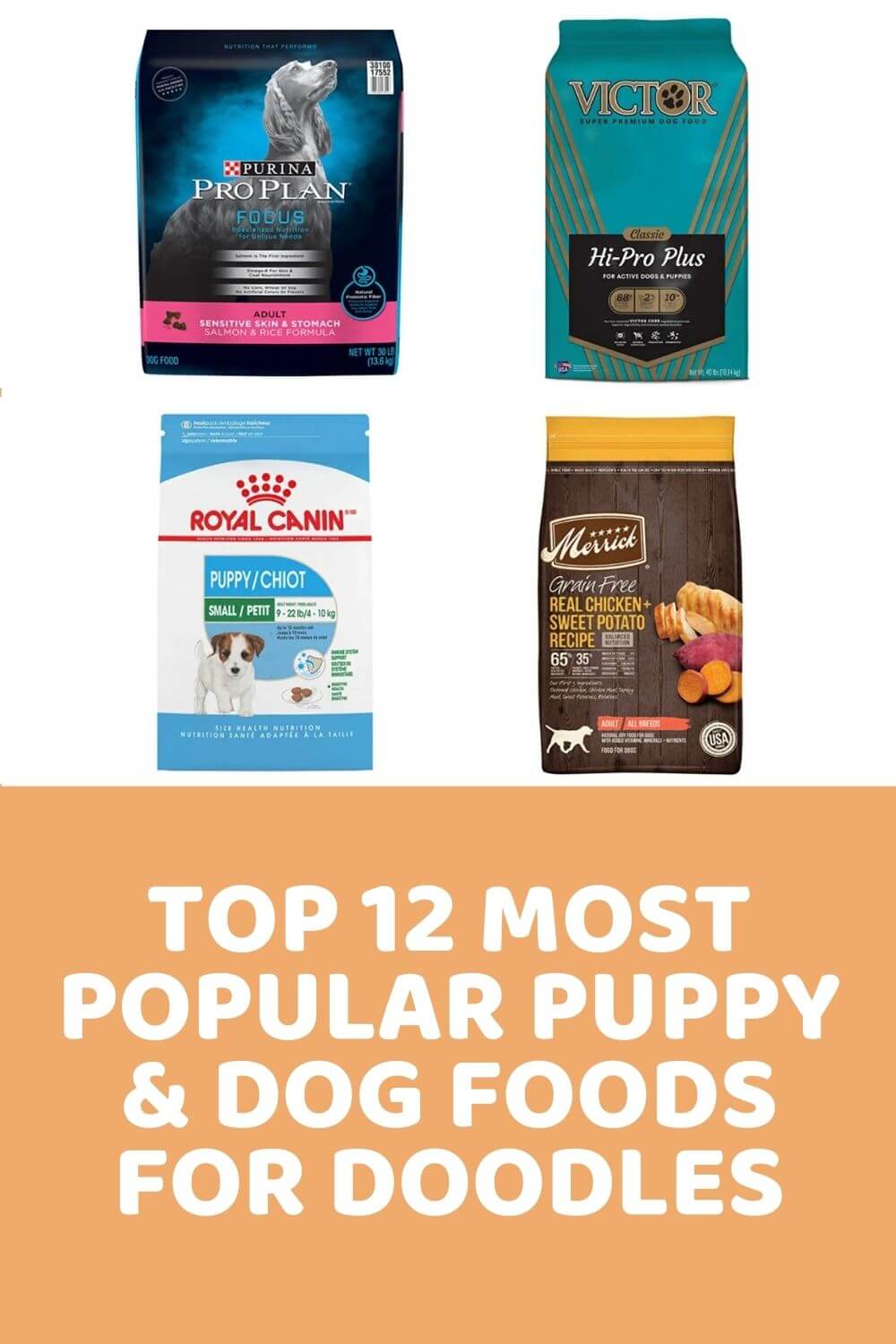
Let everyone know in the comments what food you feed your Labradoodle, and if they have any special requirements.